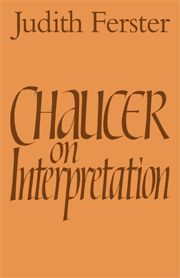Book contents
- Frontmatter
- Contents
- Preface
- 1 Introduction
- 2 Interpretation in the Knight's Tale
- 3 Reading Nature in the Parliament of Fowls
- 4 The Lady White and the White Tablet: The Book of the Duchess
- 5 Reading Griselda: The Clerk's Tale
- 6 Reading the Self: The Wife of Bath
- 7 The Politics of Narration in the Frame of the Canterbury Tales
- Notes
- Index
3 - Reading Nature in the Parliament of Fowls
Published online by Cambridge University Press: 04 August 2010
- Frontmatter
- Contents
- Preface
- 1 Introduction
- 2 Interpretation in the Knight's Tale
- 3 Reading Nature in the Parliament of Fowls
- 4 The Lady White and the White Tablet: The Book of the Duchess
- 5 Reading Griselda: The Clerk's Tale
- 6 Reading the Self: The Wife of Bath
- 7 The Politics of Narration in the Frame of the Canterbury Tales
- Notes
- Index
Summary
[L]anguage … promotes its own oblivion.
maurice merleau-pontyIN CHAPTERS 1 AND 2, I discussed the paradoxical idea that selves are isolated and alone and yet also influence each other. The mutual influence does not guarantee the success of communication or interpretation. In Chapter 2, I emphasized the interpersonal version of the paradox. In this chapter, I shall emphasize the literary version – that is, the version pertaining to authors and audiences.
Authors influence their audience (and are influenced by it) but have no way of controlling that influence. One of the causes of the author's powerlessness is the tendency of language and books to disappear. We perceive ideas, not words; meaning, not language. The right book in sympathetic hands seems at moments to provide actual rather than literary experience. Although this familiar phenomenon attests to the author's artistic power, it also deprives him of control over his readers. If what they experience seems real rather than imaginary, objective rather than subjective, the truth rather than a truth or someone's truth, then they may be less critical or self-conscious about how they accept and use it. When, as Poulet says, “the book is no longer a material reality,” the author cannot protect readers from himself. Like Prudence, he cannot keep them from doing with his message what they like and cannot keep them from being affected by it in a way he cannot predict or prevent.
- Type
- Chapter
- Information
- Chaucer on Interpretation , pp. 46 - 68Publisher: Cambridge University PressPrint publication year: 1985



